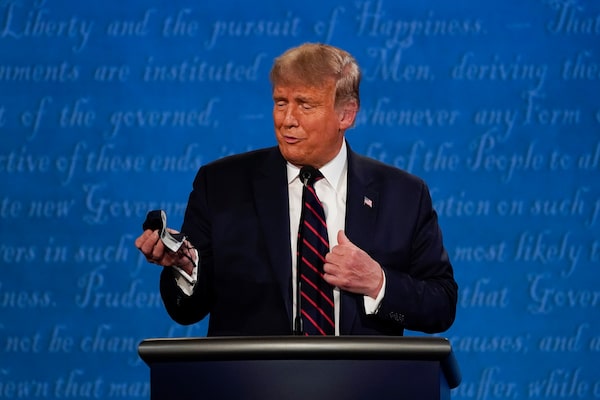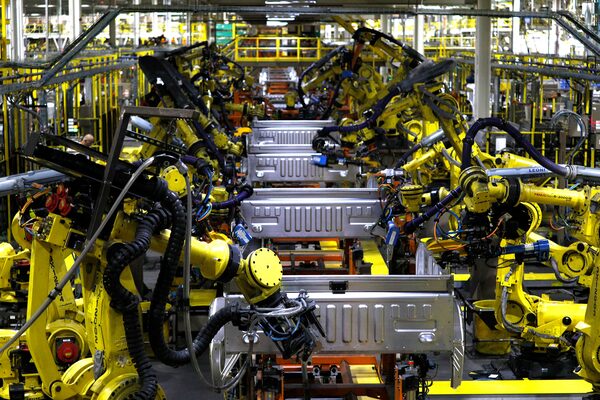COVID THROWS U.S. ELECTION CURVEBALL

In this Sept. 29, 2020, file photo, President Donald Trump looks at his facemask during the first presidential debate at Case Western University and Cleveland Clinic, in Cleveland, Ohio.Julio Cortez/The Associated Press
Donald Trump has joined the list of world leaders who fell prey to the coronavirus after shrugging off risks, scorning masks and making public appearances without following distancing guidelines. But a U.S. president testing positive, four weeks before elections, will cause far more ructions than the recent illnesses of the Brazilian or British leaders.
His quarantine period, as campaigning enters its final stretch, could help Democratic challenger Joe Biden cement his sizeable poll lead. But the possibility of Trump being hospitalised, any cabinet members falling ill, or calls to postpone elections will mean a major setback for stock markets.
A rush to hedge such risks is lifting gold prices as well as equity and currency volatility. In reality, all bets are off -- even Betfair has suspended punts on the election outcome.
RECOVERY ROAD
EU flags flutter in front of the European Commission headquarters in Brussels, Belgium Oct. 2, 2019.YVES HERMAN/Reuters
European finance ministers meet on Monday to discuss implementation of a 750 billion-euro coronavirus recovery fund, widely hailed as game-changing when it was announced earlier this year. But squabbles over disbursements threaten to sour the mood.
Germany is proposing a rule of law conditionality scheme for countries accessing funds from the bloc; some lawmakers favour an even stronger link. In July, the EU declined to settle details to avoid vetoes from Hungary and Poland. So the meeting could well see an outcry from those two countries.
The first bond sale to finance the SURE jobless scheme is weeks away, a step towards making the European Union one of Europe’s most significant borrowers. But delays to the fund spell bad news to economic recovery.
POOR SERVICE

Ford F150 trucks go through robots on the assembly line at the Ford Dearborn Truck Plant on Sept. 27, 2018 in Dearborn, Michigan.Bill Pugliano/Getty Images
As the world economy recovers, a gulf is opening between manufacturing and services, the latter hit by renewed COVID curbs and the ending of emergency unemployment schemes. Following Europe’s sharp services PMI contraction, U.S. September data are due on Monday.
Remember, services such as retail, hospitality or transport account for two-thirds of U.S. jobs. But so far, unlike Europe or Japan, U.S. non-manufacturing activity remains in expansion territory, an index from the Institute of Supply Management showed.
That may change if additional assistance for the unemployed and small business doesn’t materialise -- personal income has already shown a drop. The House of Representatives finally approved a $2.2 trillion relief package, but the Republican-controlled Senate is expected to nix the plan.
WHEELER DEALERS
Reuters
It was the busiest summer on record for dealmakers, with global M&A activity up 80% in the year’s third quarter to a record $1 trillion-plus. But will the surge last as we enter the final stretch of 2020?
The $2.2 trillion January-September deal tally is still 21% below year-ago levels, but bankers say companies are unwilling to stand still, despite coronavirus and upcoming U.S. elections. That could lead to entire industries being reshaped -- for example, Europe’s financial sector after Spanish and Italian bank mergers.
Cross-border deals may also recover. Britain is emerging as a key focus for U.S. buyers, an example being Nvidia’s $40 billion swoop on British chip designer Arm Holdings.
Private equity may also help drive leveraged buyouts, following U.S. fund KKR, which has been a prolific investor during the pandemic.
FROZEN TO HOT

Flags of Armenia, right, and Nagorny Karabakh flutter in the breakaway Nagorny Karabakh's main city of Stepanakert on Oct. 2 during the ongoing fighting between Armenia and Azerbaijan over the disputed region.-/AFP/Getty Images
The Armenia-Azerbaijan conflict has become another stage for a standoff between Russia and Turkey, already at loggerheads over Libya and Syria.
Neither can afford a war, yet they seem incapable of avoiding a squabble, despite the toll on Russia’s rouble -- not long ago seen as an emerging-market safe haven -- and the hit to Turkey’s already embattled lira.
Coming against a backdrop of a looming U.S. election, Trump’s illness and emerging-market underperformance this year, the shifting sands of geopolitics may portend more bumps ahead for investors.